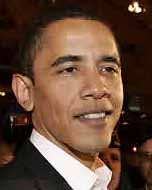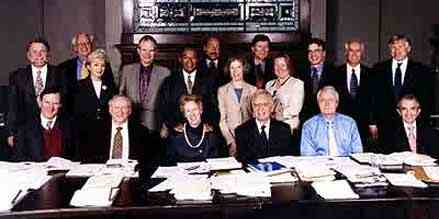|
|
TIME Magazine announced in its October 8, 2007 issue that Samantha Power will become its
foreign-affairs columnist. This is not just any journalistic job, but a plum one, not only
working for the most successful news-magazine, but getting a featured slot to boot.

Masthead of TIME page: Samantha Power featured as
new commentator
Naturally, the hypocritical world of genocide has enabled Power to be in a unique position
to reap certain rewards. Writing her "Problem From Hell" book melted the
hearts of lazy-minded intellectuals; she was against genocide, and that made her a media
darling. The stance automatically made her "moral," and made her a defender of
"human rights." (She subsequently became executive director of the Carr Center
for Human Rights.) Nobody bothered to check (or, worse, cared) whether any "less
desirable" humans were getting pummeled on her way up, and nobody (especially,
shamefully, the top journalists and professors from the Pulitzer committee; see next
paragraph, and photograph below) checked the journalistic standards of her book,
particularly the way she set about establishing the foundation for an Armenian
"genocide." The cultural elite simply fell over themselves in ways to reward
this angel who was outraged over the worst crime against humanity.
She actually received a 2003 Pulitzer, as TIME Managing Editor Richard Stengel informed in
his editorial announcing Power's arrival ("Iraq Churns On"), along with a
National Book Critics Circle Award. "Not bad for something that started out as a
class paper," Stengel beamed. (He explained the peculiar reason for Power's
attendance in Harvard Law School was a means for Power to be "determined to write
about why governments do little in the face of atrocity.")

Barack Obama |
Power evidently had the power to hobnob with intellectual
circles (she also attended Yale; it's usually difficult and expensive for commoners to
gain entrance into the nation's hoitiest and toitiest ivy league universities,
particularly for frivolous reasons such as attending law school in order to become a
writer), and once she tapped into phony genocide sensibilities, the world became hers. She
even became an "informal, unpaid adviser to Senator Barack Obama," which
probably had a lot to do with Obama's suddenly harping over the "Armenian
genocide." (Not that Obama needed Power to harp; it is a given that any U.S.
politician seeking election must curry favor with the wealthy, influential and bullying
Armenian community, and the best way is to share their genocide fetish.) Obama appears to
be a nice man, but it does not say much about his analytical skills to reach important
conclusions based on one-sided propaganda (nor does it say much about his judgment, for
allowing a blatant propagandist by his side).
Power's first TIME topic had to do with the plight of millions of Iraqi refugees, and
Stengel opined that Power was "uniquely equipped to think though this morality
tale." In other words, Samantha Power hates genocides. (At least certain
genocides, or would-be genocides, at the expense of less popular genocides.) That makes
her more "moral" than most.
It is this impression of her as a moralist and ethicist that has opened so many doors for
Samantha Power. This is a benefit of joining the genocide club; one could even become a
prestigious columnist for TIME Magazine.
The tragedy is, of course, that Power is really an "immoralist." It is
immoral to accuse another of a ruinous crime, particularly murder, if one does not have
the evidence. (Even more so when the "another" is a nation.) It is also highly
immoral to close one's eyes to the high
crimes of the designated victims, and to invite hatred against the group that is
designated as the villains; particularly by comparing them with Nazis. (In the PBS
propaganda show, "The
Armenian Genocide," Power actually put modern, and not simply Ottoman, Turks in
the role of Nazis.)
.
|

photo: Joe Pineiro
 |
|
Dr.
Patricia Limerick, who
won a "genius award,"
and appears to be a very
qualified historian. Why
didn't she check the
propagandistic sources
of Power's first chapter?
Why didn't any of these
"professional" people?
Why do brains go to
mush when the topic is
"genocide"? |
The 2003 Pulitzer Board that voted to
reward Samantha Power for her book perpetrating hatred against Turks on no evidence, "A
Problem From Hell." Perhaps some of these people declined to support this
book, but most likely the bulk pitched in, to show how liberally "moral"
they were, to be on the right side against "genocide." They went out of
their way to award Power $7,500 and a special prize in General Non-Fiction, a
"distinguished" book "not eligible for consideration in any other
category."
Back row left to right: Mike Pride (Editor,
Concord Monitor), Andrew Barnes (CEO, St. Petersburg Times), Rena Pederson
(Editor, Dallas Morning News), Paul Steiger (Mng. Ed., Wall Street Journal), Henry
Gates (Humanities Professor, Harvard University), Jay Harris (Director,
Journalism and Democracy, USC), Joann Byrd (Editorial Page Ed., Seattle Post-Inteligencer),
David Kennedy (History Professor, Stanford University), Amanda Bennett
(Editor, Lexington Herald-Leader), Anders Gyllenhaal (Editor, Star Tribune), Richard
Oppel (Editor, Austin American-Statesman), Lee Bollinger (President,
Columbia University). Front row left to right: Donald
Graham (Chairman, Washington Post), William Safire (New York Times), Sandra
Rowe (Editor, The Oregonian), Sig Gissler (Administrator, Grad. School of
Journalism, Columbia), John Carroll (Editor, Los Angeles Times), Louis
Boccardi (CEO, Associated Press); not pictured:
David Klatell, (Dean, Grad. School of Journalism, Columbia).
The jurors who nominated the book were Richard Bernstein, New York Times book
critic, Diane Ackerman, and Patricia Limerick, Professor of History,
University of Colorado.
|
But doesn't TIME Magazine have journalistic standards? Shouldn't TIME require more
from a journalist, than simply blowing moral smoke?
A reporter's duty is to question. A reporter has an ethical responsibility to
investigate all sides of an issue before making impartial conclusions. Samantha
Power does not operate in this fashion. Samantha Power, at least with issues she is
too emotional about (which puts into question anything else she analyzes), begins
with the conclusion first, and is not averse in using any contaminated claims that
will back up her agenda.
Any professional journalist who takes the trouble to look into how Samantha Power built her case for the Armenian
"genocide" would have his or her hair stand on end. Almost without
exception, in the first chapter of her book, Power has relied on 100% pure
propaganda. (Mainly "Ambassador Morgenthau's Story," and bigoted,
hearsay-ridden New York Times articles, one of which she points to actually
admitting how "unreliable" the massacre stories were, because no
U.S. journalist witnessed anything firsthand.)
(But, of course, one did. His verdict:
no genocide.)
Moreover, Power reportedly admitted in her 2002 book tour appearance at the U.S. Holocaust
Memorial Museum that she has read many contra-genocide books, which means that she
deliberately ignored the rock-solid and generally Turk-unfriendly sources which
cannot be construed as propaganda; in other words, if what she claimed was true, she
cannot cop an ignorance plea, and she is a deliberate manipulator, and a conscious
deceiver.
In her Armenian chapter, she referred to the forgeries of Aram Andonian not once, but three
times.
How could TIME Magazine be caught dead hiring a writer who not only purposely omits
the real facts, but unconscientiously presents blatant lies?
|
| |
Before we fault TIME for having hired someone based on political celebrity
rather than for journalistic excellence, we must ask, how has TIME itself sized up the
Armenian "genocide"?
The answer comes as no surprise. For reasons of prejudice and/or politics, TIME is fully
in support of this "genocide" as a reality.
Lucky for TIME it wasn't around during the WWI years, otherwise its "genocide"
history could have been almost as disgraceful as that of The New York Times. Its
"genocide" coverage has not been plentiful, but there is one striking example
from Aug. 23, 1982 that deserves special notice.
We learn of an Armenian terrorist episode in Ankara which killed nine and wounded
seventy-two, and the article correctly begins with, "The (anti-Turkish) hatred is
venomous, relentless and overwhelming." Sounds like a set-up for faulting these
fanatical Armenian terrorists, doesn't it? Surely we expect a sense of sorrow over this
horrifying episode of violence against humanity.
Yet the sorrow never arrives. Instead, we soon get the picture that TIME itself is a
contender for this "venomous, relentless and overwhelming" anti-Turkish
hatred.
The segue to the article's hateful portion tells us that a French official recognized
these "1915" events as genocide, which led to TIME's point of Turkish protest "contributing
to an atmosphere that encourages Armenian violence." There is truth there as
well, but what we are really being told is that the Turks were in the wrong, and thus what
the Armenian terrorists were doing was somewhat justifiable.
Whenever an Armenian terrorist was caught in France, the French government usually let the
perpetrators go with a slap on the wrist. (Even the rare ones with heavier sentences were released after a few years.) It was
this condoning of Armenian propaganda that fed, and still feeds, the ever continuing cycle
of hatred. And TIME did not disappoint; with this particular article, TIME decided to
blatantly publicize Armenian propaganda, in a piece that initially promised to vent
outrage on a destructive terror incident.
The article tells us in no uncertain terms who the real criminals and the real victims
were. "During World War I, the Turks exterminated or deported virtually their
entire Armenian population because they held the unfounded suspicion that members of the
ethnic group were disloyal." Note TIME's irresponsible journalism. The word
"allegedly" wasn't even added before the word "exterminated," which is
curious, because there is no evidence of murder, or "extermination," on the part
of the Ottoman government. (To the magazine's credit, the article would actually take a
stab at offering real proof, however; read on.) We can only approach genocidal territory
if a nation deliberately and systematically targeted innocents. Most Armenians, like most
Turks, died of famine and disease; murdered Armenians died in the hands of marauders and
renegade forces. (Whereas the bulk of the half-million Ottomans killed in the hands of
Armenians had to have been systematically
destroyed under a predetermined plan.)
As far as how "unfounded" the "suspicion" was, regarding Armenian
disloyalty, who better to ask than a primary Armenian leader of the period, Boghos Nubar (January 30, 1919, The Times of London):
"...[E]ver since the beginning of the war the Armenians fought by the side of the
Allies on all fronts...the Armenians have been belligerents de facto, since they
indignantly refused to side with Turkey." Nubar bragged of a combined Armenian
force of 200,000, a serious number, perhaps some 60,000 greater than the number of
American soldiers used in the first phase of the Iraqi invasion. (Not that all
200,000 were involved at once in the Ottoman front; yet, perhaps 100,000 Ottoman-Armenian men had
defected to the Russian side, either by crossing the border or by staying behind to fight,
and there is no question that the Armenians declared war.
Since the 1948 U.N. Convention on Genocide exempts political groups, as even Power noted
in her "Hell" book, already we know the Armenian experience cannot be
termed as a "genocide."
Here's how the Armenians' and Samantha Power's own guru, Ambassador Henry Morgenthau, felt
about the likely U.S. response, if the USA should ever be victimized by a rebellious and
traitorous community during a time of war (from his 1918 "Story" book): "'But
I am told,' said Von Jagow, 'that there will be an insurrection of German-Americans if
your country makes war on us.' 'Dismiss any such idea from your mind,' I replied. 'The
first one who attempts it will be punished so promptly and so drastically that such a
movement will not go far...'" Naturally; it would normally be considered any
nation's right to defend itself from forces out to destroy the nation.
If war were a matter of national life and death, as was the case with the Ottomans, maybe
the USA would not have even bothered (given the scenario mentioned above) with a
"deportation," which is the pro-Armenians' synonym for "genocide." If
German-American rebels committed atrocities upon America's defenseless populace, with
soldiers away at multiple fronts, perhaps the U.S. would have shot first and asked
questions later. As America basically did in the Philippines, barely a generation prior to WWI.
|
|
At least TIME'S 1982 article offered the one thing truth-seekers would demand and
respect; actual, concrete evidence that would prove a systematic
extermination plan, or "genocide":
"The decision to undertake the genocide was communicated to the local
leaders by the Interior Minister, Talaat Pasha, in 1915. One of his edicts stated
that the government had decided to 'destroy completely all Armenians living in
Turkey. An end must be put to their existence, however criminal the measures taken
may be, and no regard must be paid to age, or sex, or to scruples of conscience.'"
There you have it, ladies and gentlemen. TIME Magazine applied its highest
principles of journalistic integrity by coming up with the irrefutable proof.
Imagine, a written order from Talat "Adolf Hitler" Pasha, himself!
Unfortunately, the one who wrote those words was not Talat, but Aram Andonian.
Indeed, Samantha Power's favorite forger.
Suddenly, the fact that TIME hired Samantha Power makes perfect sense.
|
| |
|
|